On July 24, the world's largest AI open-source community, Hugging Face, released the latest large model ranking, where Alibaba's Qwen3-Coder made a stunning debut, topping the list and becoming the most popular open-source AI programming model globally, even surpassing the highly anticipated GPT-4.1 and Claude4.
Qwen3-Coder is the first code model in the Qwen series to adopt a mixture of experts (MoE) architecture. This innovative architecture has led to significant breakthroughs in code capabilities and Agent calling abilities, especially excelling in multiple Agent capability evaluations. The model is widely regarded by industry professionals as the most promising open-source programming model that could potentially replace Claude, demonstrating strong market competitiveness.

Since the open-source release of Qwen3-Coder, its downloads have quickly exceeded 20 million, showing its popularity. Alibaba's move has not only attracted significant attention within the industry but also sparked widespread discussions on social media. On the day Qwen3-Coder was released, Hugging Face's CEO Clement Delangue posted 12 tweets in a row, praising the model's outstanding performance. In addition, Aravind Srinivas, CEO of Perplexity, and Jack Dorsey, co-founder of Twitter, also publicly praised Alibaba's Qwen series on social platforms, highlighting the influence of Qwen3-Coder in the AI community.
The success of Qwen3-Coder not only marks a significant breakthrough for Alibaba in the field of AI technology, but also brings reputation to China's open-source models on the international stage. With continuous technological advancements, Qwen3-Coder may provide developers with stronger programming support and promote the widespread application of AI.
In the future, we look forward to Qwen3-Coder showcasing its excellent performance in more practical applications, helping global developers improve productivity and create more innovative works.
